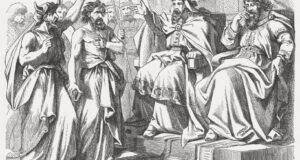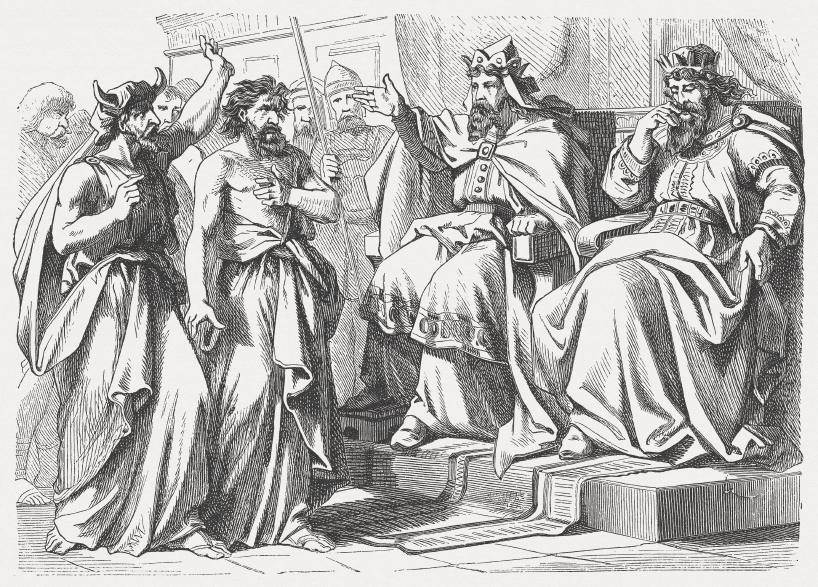The early councils had as their primary purpose the defense and establishment of truth, not unity.
—Rousas J. Rushdoony, Foundations of Social Order (1978)
Loving Those Who Hate God?
“Should you help the ungodly, and love those who hate God?” This was the rhetorical question the prophet Jehu put to Jehoshaphat, king of Judah (2 Chron. 19:2). Jehoshaphat had gone to Israel, the northern kingdom, on a good will visit. The two Hebrew kingdoms had been at odds for a long time, and Jehoshaphat was trying to fix things up. He hoped to reunite the covenant people of God. With that in mind, he allied himself with King Ahab in a military campaign to recapture the Syrian-held city of Ramoth-Gilead. But Ahab was a most ungodly king.

This military alliance wasn’t Jehoshaphat’s first or last attempt to establish some sort of formal connection between the two kingdoms. After Ahab’s death, Jehoshaphat joined Ahab’s heir in a maritime trading venture (2 Chron. 20:35-37). But God destroyed their ships. And when Ahab’s next son came to the throne, Jehoshaphat joined with him in a campaign to subdue Moab. “I am as you are, my people as your people, my horses as your horses,” he told the new king (2 Kings 3:7). He had said the same thing to Ahab before the battle at Ramoth-Gilead (1 Kings 22:4).
But far more serious than any of these was the marriage Jehoshaphat arranged for his firstborn son, a marriage to Ahab’s daughter, Athaliah. Ahab approved. So did his wife, Jezebel. Jehoram married Athaliah, and the princess came to Judah with hopes of becoming the next queen. Athaliah brought her religion with her. No surprise… she served Baal, the god of her mother.
Consequences
The worst consequences of Jehoshaphat’s alliance with Israel didn’t come until he was dead. Then Jehoram came to the throne; Athaliah was his advisor (2 Chron. 21:6, 13). They led Judah into Baal worship. Their son, Ahaziah, succeeded his father, but Athaliah continued as the real power in Judah. And when Ahaziah’s life and reign were cut short, Athaliah usurped the throne. She went into the royal nursery and murdered all the royal seed, all the remaining seed of David (2 Kings 11:1-3). Had it not been for the overruling providence of God, the promise of the Messiah would have ended there. But the princess Jehosheba rescued one child from the palace and hid him in the temple. Athaliah reigned over Judah for seven terrible years before that little boy was ready to come to the throne.
Motivations?
Why did Jehoshaphat entangle his family and kingdom with an apostate dynasty and a backsliding nation? Scripture says many good things about his character and reign, so we should assume that his actions were motivated by a misguided, but sincere attempt to do good. Jehoshaphat’s thoughts probably ran something like this: We are all God’s people. After all, Yahweh Himself continues to send prophets to the northern kingdom. He obviously hasn’t abandoned them. The northern kingdom no less than the southern stands within the covenant that God made with our fathers. Yes, they have some liturgical and theological problems, but they sincerely believe they are worshipping God through these calves of theirs. If we can only get over past differences and somehow bind the kingdoms together, we’ll be able to accomplish so much more for God and His kingdom. If we let the current division stand, how will we ever influence the northern tribes towards righteousness? We must be patient and show them the love of God.
Ecumenicism in America
The issue of formal unity among God’s covenant people has been a recurring issue in American church history. The creation of the Federal Council of Churches (1908) is one instance. Evangelicals were sensitive to the need for greater understanding and cooperation among the various conservative denominations. Liberals saw the social and political advantages of confederation.
The main obstacle to organizational unity was confessional theology. Each denomination had its own doctrinal standards. Each believed that its standard more accurately represented the system of truth contained in Scripture than did the standards of other denominations. This limited the degree of cooperation or formal union to which any evangelical denomination was willing to commit. Evangelicals didn’t want to compromise the faith as they understood it. Liberals, of course, were critical of such “narrow mindedness,” and it stood in the way of their agenda.
Typical of this criticism were the words of Bishop Francis J. McConnell: “We are coming to see, from the Christian standpoint, that truth is true living.” In other words, truth isn’t in words, in propositional formulations, but in action. In this same vein, Dean Shailer Matthews said, “If the Council of Nicea, instead of wasting weeks over the discussion of a word, had organized a mission society to go into Germany what a different story history would have told.” But just what message would that missionary society have carried?
The Ecumenical Council of Nicea
Nicea was the fourth-century ecumenical council that defended the deity of Christ. Much of the discussion at Nicea turned on two Greeks words: homoousion and homoiousian. The first means “of one essence” and the second, “of like essence.” The words differ in spelling by only a letter, but their respective meanings represent theologies wholly alien to one another. The first represents the belief that Christ is fully and truly divine. The second makes him something else—however “like” God that something else might be. The first stands for a gospel of sovereign grace through a divine Savior. The second stands for a Pelagian gospel of the continuity of being, the innate divinity of all men, and salvation by good works.
We rightly speak of Nicea as an ecumenical council because all parts of the Christian world were represented. But this was ecumenicism that valued truth and sound doctrine over outward unity. Rushdoony writes:
The ecumenical councils of the early church were in their purpose and nature very different from the modern councils and ecumenical efforts of the church. First, the early councils had as their primary purpose the defense and establishment of truth, not unity. Unity had to be established on the foundation of truth, not truth as the product of unity. The council came together for the purpose of conflict, the battle of truth against error, and any unity on other than the whole truth of Scripture was anathema. Second, the concern of the council was primarily the faith, not the church. Institutionally, the church suffered because of the conflict, but theologically it flourished and ensured its survival and growth. The modern ecumenical movement, and modern councils, are thus in purpose and work in direct contrast to the early councils: their concern is with unity, and with the institution, not the faith primarily. (FOSO, 19-20)
Christ or Belial?
The English word “love” confuses the issue of external unity. We “love” our God, our children, our cat, and our favorite cola. Love needs definition. Paul tells us that love is the fulfilling of the law (Rom. 13:8-10). If I love my neighbor, I will respect his authority, life, marriage, property, and reputation, both in deed and in thought. This doesn’t mean that I must tolerate his wickedness, let alone join him in it. I can love my neighbor and still rebuke him for his sin. In fact, true love will move me to do exactly that (Lev. 19:17-18).
And when Jesus commands us to love our enemies, He doesn’t leave what that might mean to our sentiments and imagination. He gives us concrete examples of what He means:
But I say unto you, Love your enemies, bless them that curse you, do good to them that hate you, and pray for them which despitefully use you, and persecute you. (Matt. 5:44)
God does good to all men, regardless of their character or eternal destiny. He makes the sun to rise and the rain to fall upon all (Matt. 5:45). We are to imitate our heavenly Father. But, again, such love doesn’t require us to enter into intimate friendship or covenant alliances with the wicked—quite the opposite. Our God, after all, is holy. Paul writes to the Corinthians,
Be ye not unequally yoked together with unbelievers: for what fellowship hath righteousness with unrighteousness? and what communion hath light with darkness? And what concord hath Christ with Belial? or what part hath he that believeth with an infidel? And what agreement hath the temple of God with idols? for ye are the temple of the living God; as God hath said, I will dwell in them, and walk in them; and I will be their God, and they shall be my people. (2 Cor. 6:14-16)
Paul continues with this call to separation from the wicked and loyalty to Christ:
Wherefore come out from among them, and be ye separate, saith the Lord, and touch not the unclean thing; and I will receive you, Wherefore come out from among them, and be ye separate, saith the Lord, and touch not the unclean thing; and I will receive you, And will be a Father unto you, and ye shall be my sons and daughters, saith the Lord Almighty. (v. 17-18)
Conclusion
Shall we love the ungodly? If that means doing them good, praying for their souls, rebuking their sins, and sharing with them the gospel, then, yes, absolutely. But if love means compromising doctrine, embracing relativism, and winking at sin, then the answer is very much, no! Jehoshaphat, godly man that he was, nearly destroyed the promise and thus the world by his well-intentioned love for God’s enemies. God calls us to a purer and more difficult love than that.
For Further Reading:
C. Gregg Singer, Unholy Alliance (New Rochelle, NY: Arlington House, 1975).
J. Marcellus Kik, Ecumenism and the Evangelical (Philadelphia: Presbyterian and Reformed Publishing Company, 1958).
Rousas J. Rushdoony, The Foundations of Social Order, Studies in the Creeds and Councils of the Early Church (Fairfax, VA: Thoburn Press, 1978).
Rousas J. Rushdoony, The Roots of Reconstruction (Vallecito, CA: Ross House Books, 1991), “Love and Hate,” 562-564.











